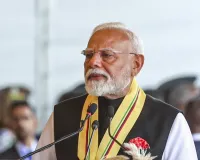Himanta Biswa Sarma, Muhammad Yunus, N Biren Singh Northeast leaders bash Bangladesh's Yunus for 'landlocked' remarks on India's 'seven sisters'

The statement, made during a high-level meeting in China, immediately sparked outrage across India, with prominent figures from Assam, Manipur, and beyond calling the comments offensive and provocative.
Assam CM Himanta Biswa Sarma's response
Assam Chief Minister Himanta Biswa Sarma led the charge in condemning Yunus' comments. In a statement posted on social media, Sarma expressed strong disapproval, saying the remarks were “offensive” and highlighted the ongoing vulnerability associated with India’s strategic "Chicken’s Neck" corridor. The corridor, a narrow land passage connecting the northeastern states to the rest of India, has long been a topic of concern for India’s security and logistical planning.
Sarma also stressed the importance of developing robust infrastructure in the region to strengthen India’s control over the area, particularly focusing on improving road and rail networks to bypass the Chicken’s Neck. "It is imperative to develop more robust railway and road networks both underneath and around the Chicken’s Neck corridor. Additionally, exploring alternative road routes connecting the Northeast to mainland India should be prioritized," Sarma added. He warned that Yunus' remarks reflected broader geopolitical ambitions that India could not ignore.
https://twitter.com/himantabiswa/status/1906900955532042395?ref_src=twsrc%5Etfw%7Ctwcamp%5Etweetembed%7Ctwterm%5E1906900955532042395%7Ctwgr%5E63e94f4f1b9915295308f70bca2074c46d7abc49%7Ctwcon%5Es1_&ref_url=https%3A%2F%2Fwww.indiatvnews.com%2Fnews%2Findia%2Fnortheast-leaders-bash-bangladesh-s-yunus-for-landlocked-remarks-on-india-s-seven-sisters-2025-04-01-983339
Manipur's Former CM N Biren Singh’s critique
Manipur's former Chief Minister, N. Biren Singh, echoed Sarma’s sentiments, emphasizing that Yunus' statement was an attempt to turn the northeastern region into a strategic pawn in Bangladesh's geopolitical play. Singh condemned the remarks in the strongest terms, reiterating that India’s unity and territorial integrity are "non-negotiable and cannot be challenged by anyone."
In his response, Singh also urged Yunus to exercise caution, stating that reckless comments of such nature could have serious repercussions. “Such provocative and irresponsible statements are unbecoming of a leader. Let it be made absolutely clear, India’s unity and territorial integrity are non-negotiable and cannot be challenged by anyone,” Singh posted on social media.
https://twitter.com/NBirenSingh/status/1906960458088874155?ref_src=twsrc%5Etfw%7Ctwcamp%5Etweetembed%7Ctwterm%5E1906960458088874155%7Ctwgr%5E63e94f4f1b9915295308f70bca2074c46d7abc49%7Ctwcon%5Es1_&ref_url=https%3A%2F%2Fwww.indiatvnews.com%2Fnews%2Findia%2Fnortheast-leaders-bash-bangladesh-s-yunus-for-landlocked-remarks-on-india-s-seven-sisters-2025-04-01-983339
Pradyot Manikya’s Fiery Response
Pradyot Manikya, the chief of the Tipra Motha Party, provided an even more aggressive stance, urging India to consider securing its access to the sea by pursuing a more forceful approach. Manikya controversially suggested that India should contemplate breaking up Bangladesh in order to access the sea directly, criticizing India’s historical decision to relinquish control over Chittagong Port in 1947.
"The Chittagong hill tracts were always inhabited by indigenous tribes that always wanted to be part of India since 1947," Manikya argued. He suggested that the indigenous communities in Bangladesh, including the Tripuri, Garo, Khasi, and Chakma people, who he claimed lived in poor conditions, should be supported in the quest for a strategic sea route for India.
Yunus’s remarks and geopolitical implications
Yunus' remarks, made during his visit to China, included a reference to the northeastern states of India as a "landlocked" region with no access to the ocean, a statement he said presented a strategic opportunity for Bangladesh to align with China. Yunus called Bangladesh the “only guardian of the ocean” in the region, thereby framing the country as a key partner in the region's geopolitical landscape. His statements raised concerns that Bangladesh, with Chinese support, could potentially increase its economic and strategic influence in the northeastern states of India.
In addition to his controversial statements regarding the "landlocked" status of India's northeastern region, Yunus also signed several agreements with China during his visit, signalling an effort to expand Bangladesh’s economic ties with Beijing. This has added a layer of complexity to the already sensitive relations between India and Bangladesh, particularly in light of China’s growing presence in the region.
About The Author
Welcome to Aryan Age, an English newspaper that has been serving readers since 2011 from Delhi. With a loyal circulation of over 19,000, we are dedicated to providing our readers with the latest news and information, as well as insightful analysis and commentary that help them navigate the complex and rapidly changing world.










Comment List